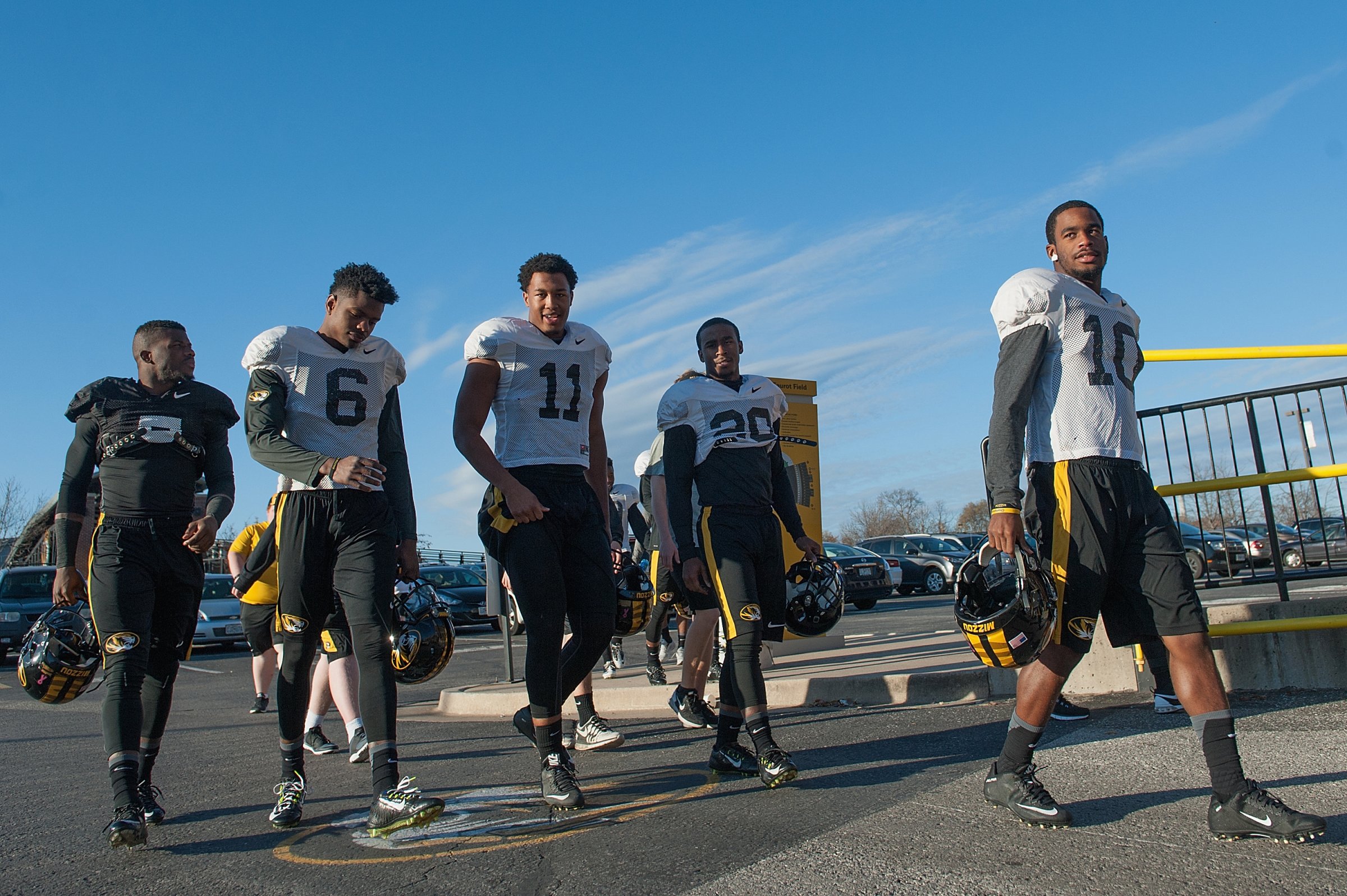
Historian Taylor Branch famously detected “an unmistakable whiff of the plantation” in college football. This officially “amateur” sport generates nearly $3.5 billion a year, but the young men who play the game–predominantly African American—don’t see a dime of it. Yes, they get tuition, room and board, plus lots of Nike, Adidas or Under Armour gear (making them walking advertisements), but they’re essentially free labor. We call them “student athletes,” but the athlete part always takes precedent over the student part.
Almost always. What happened this week at the University of Missouri might not count as a full-scale revolt on the football plantation, but it surely demonstrates the power big-money sports wields at big-time universities. The football field-hands threatened to withhold their labor in solidarity with students fed up with the administration’s indifference to systemic racism. Somebody drew a swastika in human excrement on a dorm wall; students walking on campus got called “nigger.” Yet the school’s president, Timothy M. Wolfe, felt no apparent urgency in addressing these issues. You’d think that on a campus barely two hours away from Ferguson, the grown people might have understood that race had become a bit sensitive. By Monday afternoon, Wolfe and Missouri’s Chancellor, R. Bowen Loftin, had both stepped down.
Wolfe, a former software executive who’d also been a high school football star, did not resign when a slew of Missouri faculty declared their lack of confidence in him. Nor when the group Concerned Student 1950 demonstrated against him, even confronting him at the Homecoming Parade. Nor because Jonathan Butler, a graduate student, went on a hunger strike. But when the football team turned against him, he had to go. If the Tigers refused to play BYU at Kansas City’s Arrowhead Stadium this weekend, essentially a home game, it would cost the university a $1 million “default fee,” plus all the lost revenue from merchandise, hotel stays and bar tabs that feeds the local economy. College football means money and prestige for a university the way nothing else—not Nobel laureates, science labs, teaching hospitals, law schools, Guggenheim grants, or Rhodes scholarships—ever could. Tim Wolfe’s annual salary was $459,000; head coach Gary Pinkel’s is nearly $4 million. It’s clear who is more valuable.
African American representation on the field does not mirror that in the classroom. Non-Hispanic whites make up 58 percent of undergraduates while black students constitute only 14 percent. According to a 2013 University of Pennsylvania study on racial inequity in NCAA Division I sports, only 2.8 percent of full-time degree-seeking undergraduates were black men. By contrast, black men comprise 57 percent of college football teams, on average. At some universities it’s over 70 percent. At Mizzou it’s about 60 percent. Most college football coaches are white; only 11 of the 128 Division I head coaches are black; you can count black university presidents in Division I on one hand. A new report from the Institute for Diversity and Ethics in Sports shows that under 10 percent of head coaches in the NCAA’s Football Bowl Subdivision are black; 87 percent are white. The people in charge are white; the football workforce, whose success the university brass depends upon, is black. It was only a matter of time before a major college team decided to exercise its considerable economic power and refuse to follow orders. When the Tigers said they wouldn’t take the field, a chill surely went down the spines of power conference presidents from Ohio State to Florida State, Oregon to Clemson, the athletic boosters whose multi-million dollar business model depends on free labor, and the NCAA honchos determined to defend the “amateur” purity of college football from demands that players share the revenue.
What would happen if other college teams flexed their moral muscles? The game has brought about social change before. In the early 1970s, white coaches in the still segregated South had got tired of being whipped by integrated teams from the North and the West. They began recruiting African American athletes. The Universities of Alabama, Georgia, Missouri and other bastions of Confederate flag-waving and “Dixie”-singing institutions rethought their commitment to the Southern way of life. They preferred to beat Penn State, and so integrated. Now imagine if football players at the University of Alabama decided to skip practice until they got a commitment from the administration to recruit more African American coaches? What if the University of Mississippi’s Rebels had refused to take the field while the state flag, with its Confederate emblem, flew over it? Or maybe football players in Florida could refuse to play until the Republican presidential candidates who keep homes in the state–Trump, Carson, Rubio, Bush and Huckabee–pledge that if they’re elected, they won’t deport the young undocumented immigrants known as Dreamers. What if two of the CFB playoff teams won’t participate in the championship unless the NCAA comes up with a system to fairly compensate them for what is now unpaid labor reaping millions of dollars for everyone except the boys on the field?
Most young men don’t play football to advance social justice. They love the game; it gets them a full ride to college. A few of them–2 percent–may even go on to the sign fat NFL contracts. One white player who did not support the Missouri boycott told ESPN, “If we were 9-0 this wouldn’t be happening.” Fair enough. Maybe it takes a 4-5 team to risk their scholarships. Nevertheless, the Tigers took a stand. It worked. The college football industrial complex has now been shaken right down to its artificial grass roots.

Diane Roberts is a contributor to NPR, the Guardian and the Oxford American, among many other publications. She holds a PhD from Oxford University and teaches literature and creative writing at Florida State University in Tallahassee. She is the author of three books, including the recent Tribal: College Football and the Secret Heart of America.
More Must-Reads from TIME
- Cybersecurity Experts Are Sounding the Alarm on DOGE
- Meet the 2025 Women of the Year
- The Harsh Truth About Disability Inclusion
- Why Do More Young Adults Have Cancer?
- Colman Domingo Leads With Radical Love
- How to Get Better at Doing Things Alone
- Michelle Zauner Stares Down the Darkness
Contact us at letters@time.com